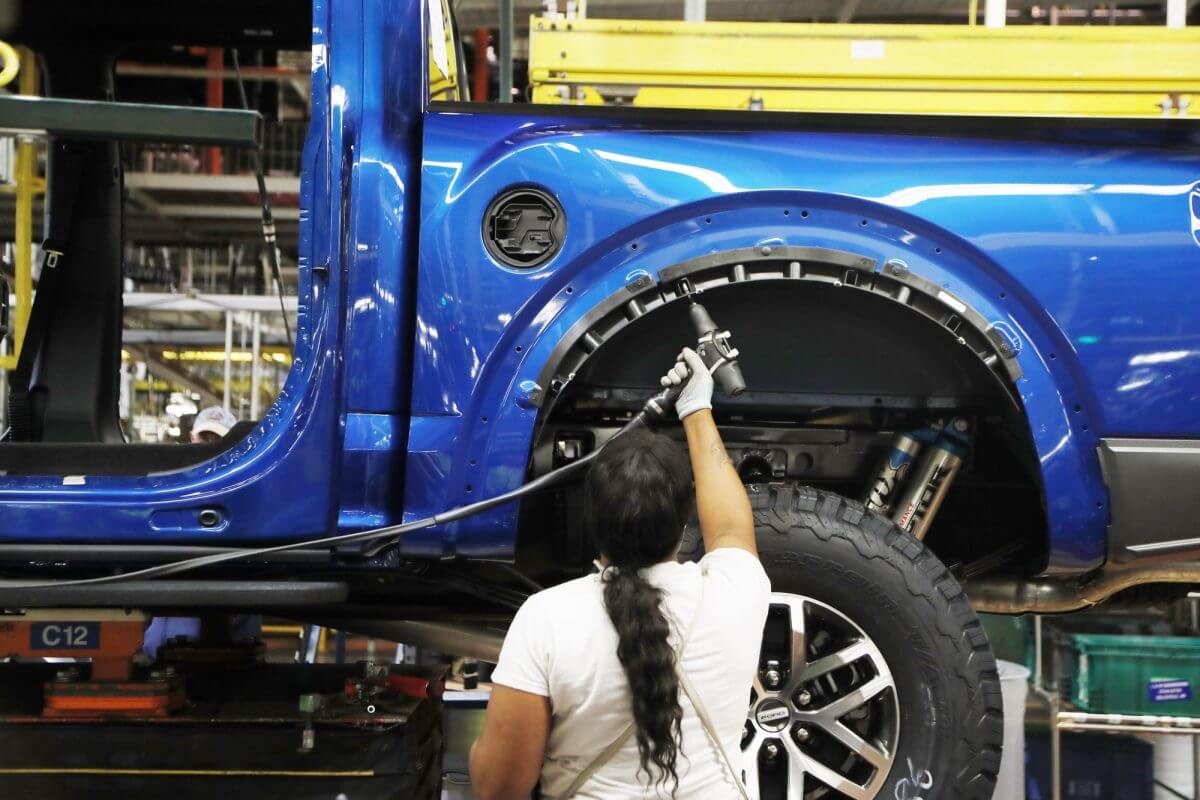
Ford barely survived the last recession. There’s strong reason to believe it’ll go bankrupt when the next one inevitably hits. | Image: AP Photo / Carlos Osorio, File
- Ford has been struggling ever since Alan Mulally left the company and there are reasons to believe the auto giant could fail to survive the next recession.
- The company’s biggest profit-generator, the F-150, will be negatively affected by rising oil prices.
- Ford’s attempts to diversify have been failing as evident from the sales trend in China.
Auto giant Ford’s (NYSE:F) share price has been on a steady decline since hitting highs of $17.72 in 2014. The company has been struggling since legendary CEO, Alan Mulally retired.
Considering what lies ahead, there are good reasons to believe that Ford’s under-performance will continue. There’s strong reason to believe it may not even survive the next recession.
Ford on a steady downward trend. | Source: Yahoo! Finance
The last decade was a difficult one for the automaker as it lagged behind its competitors in terms of innovation. The company is now trying to get ahead of the curve as it promised billions of dollars in investments in developing its electric vehicles (EV) and autonomous driving technologies.
A recession could hit the U.S. economy well before those segments start bearing fruit. There are two key reasons to believe that Ford is in for another treacherous decade, one that could push the company to bankruptcy.
Geopolitical Tensions Will Negatively Impact Ford F-150 Sales
The F-150 is Ford’s bread and butter. The pickup truck has accounted for almost 90% of the company’s profits. The truck, which has been America’s best-selling for 38 years straight, is a fuel guzzler. The F-150 is already a pricey car, and the cost to drive it is only going to go up because of the geopolitical situation in the Middle East.
After the U.S. unleashed an airstrike that killed the top Iranian general, oil prices rose significantly. But since the escalation between the U.S and Iran, the latter is potentially targeting the Strait of Hormuz, which is the world’s most important oil transit choke point.
It connects the Persian Gulf with the Gulf of Oman. Approximately 21% of the world’s oil travels from the strait, and if Iran planned to close it, it would trigger a ‘Black Swan’ event for the oil markets and cause prices to inflate further.
The world’s most crucial sea-route could be choked out by Iran. | Source: U.S. Energy Information Administration
Considering the new EV alternatives in the markets and the future instability of oil prices, buying and operating the F-150 can become unaffordable even for the Ford loyalists. This will be a devastating blow for the automaker.
Attempts to Reduce Dependence on F-150 Profits Seem to Be Failing
Ford has been pushing to shake off its ‘one-trick pony’ tag and diversify profits by expanding into new markets. The company recently announced its fourth-quarter results, which showed a 1% annual decline in domestic sales. It also sold 3% fewer vehicles than in 2018.
The main reason behind the dips was the disaster that unfolded in China. Ford’s sales nosedived 26% in 2019, marking the third consecutive annual decline. The company had reported declines of 6% and 38% in 2017 and 2018, respectively. Ford expects the trend of declining volume to continue in 2020 as Anning Chen, CEO of Ford’s Greater China, said,
The pressure from the external environment and downward trend of the industry volume will continue in 2020, and we will put more efforts into strengthening our product lineup with more customer-centric products and customer experiences to mitigate the external pressure and improve dealers’ profitability.
Ford’s attempts to expand seem to be failing. The downturn that’s set to hit the auto industry will only make matters worse in the coming years.
An overall automotive slowdown will be brutal on Ford. | Source: BCG
These factors are set to weigh heavy on the already struggling automotive giant. It’s not a question of if, but when, the next recession will hit. Ford is unlikely to survive it, just as it barely survived the last one.
Disclaimer: The opinions expressed in this article do not necessarily reflect the views of CCN.com.
This article was edited by Sam Bourgi.






